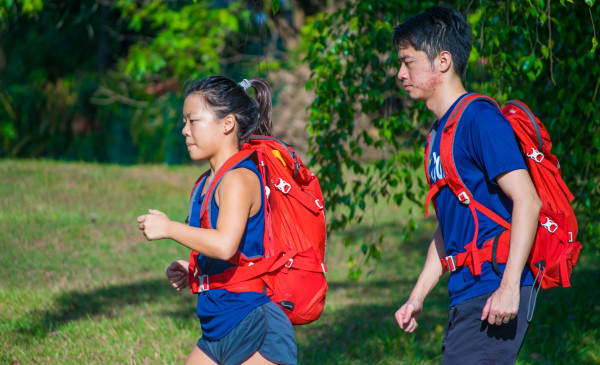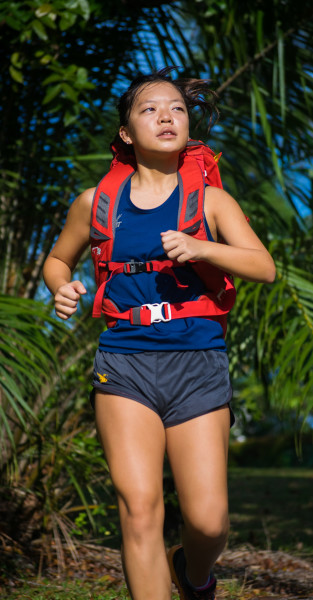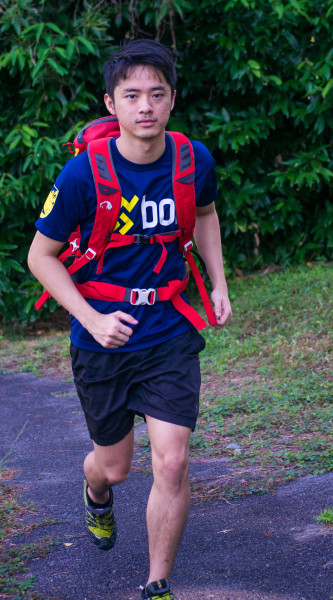John Low Zhong Heng is 23 years old and his college mate and friend, Alexis Lee Man Lin is 19 years old. But their young age will not hinder them both from running 250km through China’s Gobi Desert – from 31 May to 6 June this year. They will be doing this to raise funds for the Riding for Disabled Association, a charity that does free horse riding sessions for people with disabilities.
The two college mates will be running in the Gobi Desert March – this race is part of the Four Deserts challenge, comprising of four 250km self-supported multi-day stage Ultra Marathon races across four of the key deserts of the world.

Alexis Lee Man Lin (left) and John Low Zhong Heng (right) training with their packs.
(Photo: John Low Zhong Heng)
In the Gobi Desert, which is the world’s windiest non-polar desert, John and Alexis – both students at the National University of Singapore (NUS) – will face a variety of challenging terrain that includes grasslands, farmlands, dirt tracks, riverbeds, rolling hills and sand dunes. Temperatures in the Gobi Desert will range from 40 degrees C to minus 24.4 degrees C.
Looking forward to the Gobi Desert race
Both of them are looking forward to the Gobi Desert March. Explained John, a Life Sciences student, “This is something that I have always wanted to do, even before I had entered university. But I haven’t managed to find the time to do so until now. Also, a group from my college dorm, Tembusu College, did this last year at the Gobi Desert too, and after hearing about the adventures from my college mates, that inspired me even more to try it out for myself now.”
Added Alexis, a Business Administration student, “This is probably about the craziest thing that I have ever done so far! But I have always been one who is up for adventure. During my first year in Junior College, I went on a mountain climbing trip and I really loved it. I enjoy these types of challenges that nature presents.”
Continued Alexis, “The thought of taking on this particular challenge is so exciting. Thinking of the whole package, from the preparations and training, to actually being out there in the desert and seeing the professional ultra runners for ourselves, will be such an adventure. This also feels so dangerous and risky compared to anything I have done before.”
She also realises that when she is in the Gobi Desert, she will be spending a lot of time running alone, with not a single soul in sight. “The place is so big and there are less than 200 competitors so you will be spending long periods running in solitude and being able to reflect on things. There is plenty of self growth in that as well, that I’m looking forward to,” Alexis explained.
Have been interested in sports since their childhood days
Alexis and John have always been very sporty since their childhood days. Said Alexis, “My family have always been quite active. When I was a kid, they brought me to the sports stadium near my place every Saturday and forced me to run laps there because they wanted me to be healthy and fit. Sometimes I had just wanted to lie in bed, but my mum kept shaking me to get up – and to finish the laps before I could go back home to sleep!” Over the years though, Alexis grew to enjoy those weekly runs. Besides running, she also engages in swimming and tennis regularly, and has also played hockey for her school team.
John, however, grew to love running when he was enlisted into National Service. He explained, “I used to swim a lot when I was younger, and got my swimming certification. I also took up sailing during my polytechnic days. In the Army though, I started running a lot. My unit, the Naval Diving Unit (NDU) emphasised a lot on both running and swimming and so I really grew to enjoy running after a while too.”
Have been training hard for the race
Since registering themselves for the race in November last year, both John and Alexis have been training very hard for it, by increasing their running mileage and training with a load on their back – which they will have to do during the run in May.
Explained Alexis, “This is a self-supported race, so simply training to run long distances won’t help – as it is different to run with a load, and also in terms of going up and down hills. The terrain during the run will also be very bumpy. So I have been running about 12km to 13km several times a week, climbing stairs and training with a 7kg backpack comprising of books, dumbbells and a lot of water bottles. In the Gobi Desert, we are supposed to cover about 40km+ per day, but I don’t think I will be able to run all of it. So I have been training enough to run continuously for a quarter of the way and then walking the rest of it.”
When she goes out for a run, Alexis adds that she usually looks for places that are more bumpy, uneven and has lots of slopes, such as at MacRitchie Reservoir, to mimic the type of rocky terrain that she will face at the Gobi Desert, as much as possible.
Added John, “I have been doing roughly the same as Alexis, but also adding in some weight training sessions, to build strength and develop muscle groups that are otherwise unused. Over the course of my training, I have discovered new muscles that I never knew that I had previously!”
Their training sessions typically last about two to three hours each, but sometimes Alexis admits that it can be quite hard to juggle the training together with their studies at the university. “So sometimes, we may have to compromise and do simple exercises like planking in our rooms, if we can’t find that big block of time to spare,” she explained.
Added Alexis, “I try to train about five to six days a week, but sometimes I may give myself a break by doing cross training in the gym or doing laps at the swimming pool, as running too much may cause injuries such as Runners Knee and Achilles tendon.”
Testing their limits during training
To mimic heat exhaustion and test their limits – so that they will be familiar with the signs and symptoms of being exposed to extreme temperatures when they are in the Gobi Desert, John and Alexis have also been training during the hottest parts of the day – and sometimes with plenty of clothing on too.
Said John, “I tried training at 12 noon with a good amount of clothing on because it’s wise to expose yourself to dangers such as overheating, so that you will know what to expect when you are there. It was a very interesting experience. I felt very light headed but I was not sweating much. Usually when I run long distances, I sweat a lot But this time, there was just a small patch of sweat and an extremely giddy feeling. It seemed like my body was overheating.”
Friends and family thought they were crazy
What do their friends and families think of John and Alexis going for this adventure?
Said Alexis, “My friends thought I was crazy! Some of my male friends who are currently in National Service are just carrying a field pack, and they find it very tough to march with it. My dad is also very worried for my safety, but he is also supportive and encourages me in terms of my training and sourcing for the supplies that I will need when I am in the Gobi Desert.”
For John, his family and friends are quite supportive too. He added, “Well, my friends have told me that I’m not a young and strong 18-year-old anymore, but then again, they have always known me to be a little bit crazy anyway, when it comes to these types of things!”
Hopes to enjoy the experience
What do John and Alexis hope to achieve, out of this Gobi Desert race?
Said Alexis, “I just want to enjoy the whole experience and simply soak up the process. One of my goals is to complete it, because I would have trained so hard and done so much preparations for many months. But I also do realise that if I get injured or something happens to me and the doctors there tell me I can’t continue, then I will have to listen to them because my life may be at risk.”
Raising funds for charity
Alexis and John are also helping to raise funds for the Riding For Disabled Association with their participation in the Gobi Desert race. This is a charity that organises free horse riding sessions for people with disabilities.
Explained Alexis, “In Singapore, horse riding sessions are seen as being exclusive to the rich people. So what this charity does, is to give positive discrimination to disabled people – and makes them feel special. They have existed for 30 years and all they want is to offer free horse riding sessions to more disabled children. But they have to take care of the horses, maintain the infrastructure of the place and the operations, and the costs really add up. The charity relies very heavily on sponsors and donations to get the money, and so we really want to help them.”
They have not started fund raising yet, but Alexis and John hope to begin doing so towards the end of March to early April and are hoping to raise a minimum of $12,000, which is the rough estimate of the cost that goes into the maintenance, grooming and well being of a single horse for one year.
“It will be really good if we can live up to what we promised them by raising $12,000 to help them in their operations and giving out courses and programmes to the disabled kids and adults,” Alexis added. They are hoping to get donations through both personal contacts as well as via corporate sponsorships.
To find out more about Alexis and John’s upcoming 250km run through the Gobi Desert, and to stay updated about donations, check out their Facebook page at https://www.facebook.com/horsebackgobi?fref=ts.



Leave a Comment